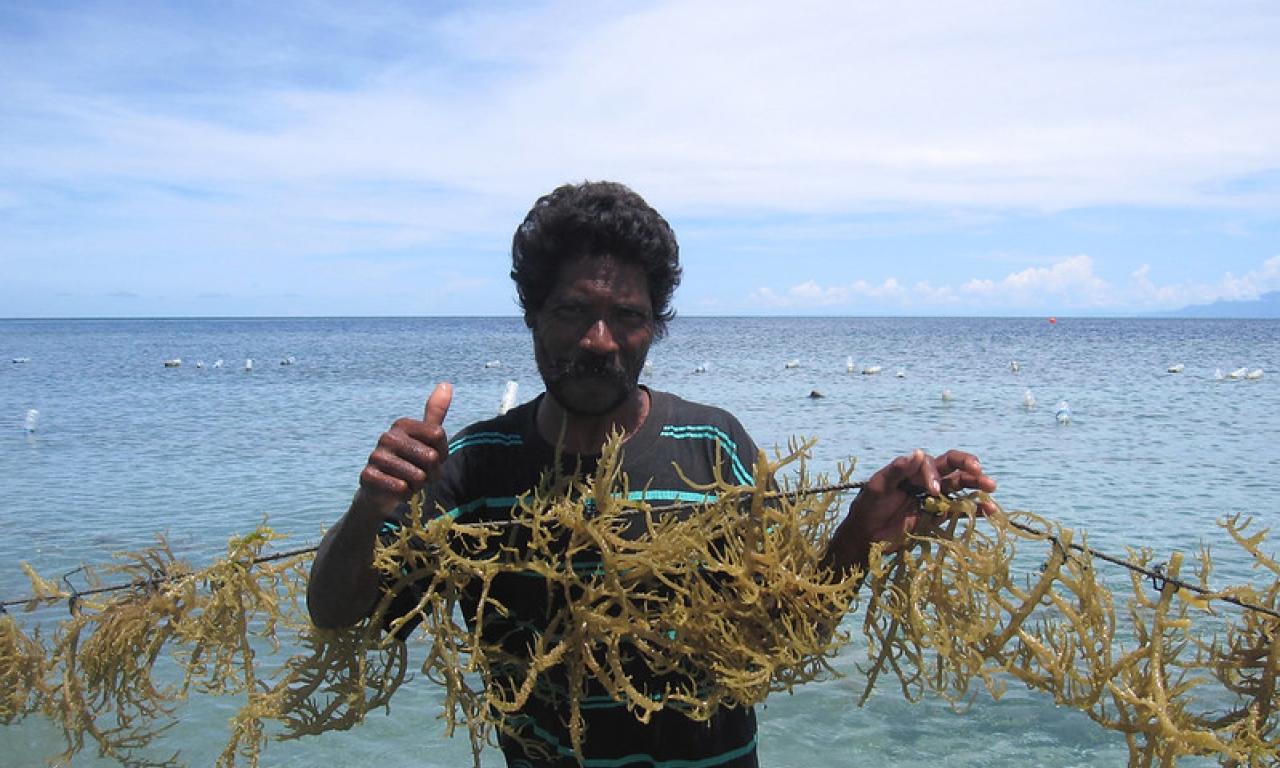
- Seaweed has immense potential to sustainably nourish nations, but its contributions to food security are often overlooked in policies and interventions
- A nature-positive solution to climate change and food insecurity, diverse seaweed species can be cultivated around the world
Seaweed holds enormous potential to transform food systems for improved sustainability, equity and nutrition. However, seaweed’s current contributions and future potential are often overlooked by the global food systems agenda. Civil society, researchers and academia must work in collaboration to utilise seaweed to improve food and nutrition security and foster nature-positive solutions to food system challenges.
A type of marine macroalgae, seaweed is both collected in the wild and cultivated in aquaculture systems. Seaweed farming produces negligible greenhouse gas emissions, as seaweed itself serves as a major carbon sink. Like terrestrial plants, seaweed uses photosynthesis to capture carbon dioxide for energy and growth. Since macroalgae grows rapidly, seaweed sequesters large amounts of carbon dioxide and produces multiple cycles for harvest within a single year – increasing profitability.
Many fishers in low- and middle-income countries are transitioning to seaweed farming because it offers a resilient source of income with few production costs. Seaweed is cheap to grow, easy to harvest and requires few external inputs. Of chief concern, it is also a decisive climate-resilient food source.
Seaweed offers sustainable, equitable and resilient livelihoods for those most vulnerable to the effects of climate change. As extreme weather events, warming seas and rising tides threaten both capture fisheries and coastal aquaculture operations, seaweed is an integral source of food and income where traditional supplies are threatened.

A WorldFish-led policy document, developed in partnership with the CGIAR Research Program on FISH, reviewed the multisectoral benefits of seaweed as a sustainable solution to food and economic insecurity in coastal communities. The document, Harnessing Sustainable and Nutritious Aquatic Foods: the Untapped Potential of Seaweed for Food Systems Transformation, seeks to re-examine the value and opportunities of seaweeds for advancing food systems transformations at the food-climate nexus.
The following are some of its key recommendations to increase the contributions of seaweed to sustainable development and resilient livelihoods:
- Promote the role of seaweed as a direct food source. A nutritional study found that certain seaweed varieties contain 70 percent of all daily macro and micronutrients recommended for pregnant women. Yet global supply data shows that the majority of seaweed is harvested for non-food use, whether medicinally or for non-edible products. Direct consumption of seaweed should be encouraged and promoted to improve diets and nutrition, especially among vulnerable populations.
- Integrate seaweed into existing aquaculture systems. Farming of seaweed in marine environments can increase the supply of nutritious food at a lower environmental cost relative to terrestrial source foods. Seaweed can be integrated into existing polyculture systems to deliver multiple ecosystem services and strengthen the system’s resilience. As seaweed releases oxygen, it increases the water’s dissolved oxygen content to prevent anoxic conditions that result in mass fish die-offs, while also filtering toxins to maintain water quality.
- Develop nature-based solutions to climate change. A natural carbon sink, seaweed is estimated to sequester up to 200 million tons of CO2 every year.When the seaweed dies, its carbon sinks to the depths of the oceans, where it can remain for a millennium. Cultivating large swaths of seaweed can offset emissions from other forms of aquaculture.
- Leverage seaweed as a means to reduce poverty and gender inequality. As traditional livelihoods are threatened, seaweed is an increasingly important source of employment and revenue in coastal communities. In low-income countries, the majority of seaweed farmers are women, whom are able to gain a degree of financial autonomy through the sector. Seaweed’s contributions to gender equality in aquaculture must be protected and expanded upon in future interventions.